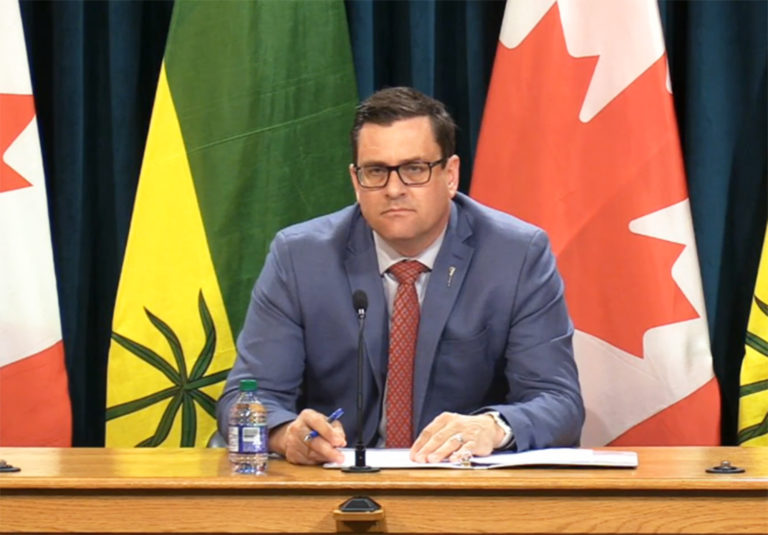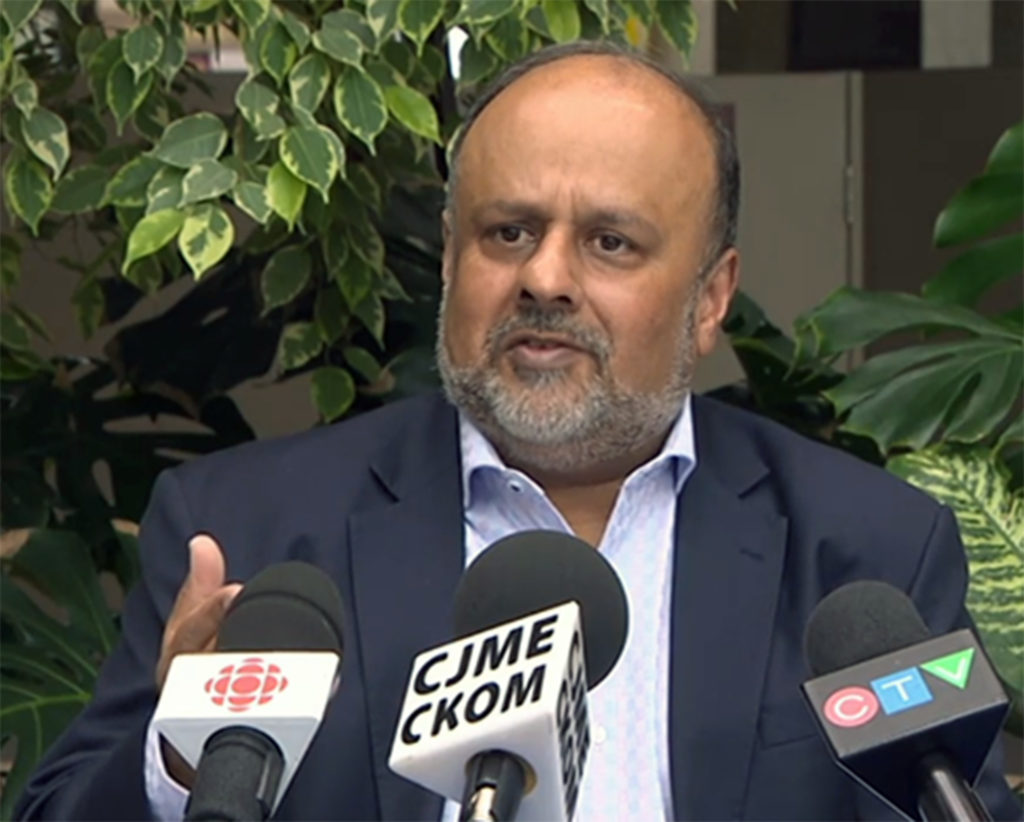
Saskatchewan Health Minister Paul Merriman defended his government’s handling of the COVID-19 pandemic, and promised to make himself more available in the future in his first press conference since Aug. 25.
Merriman spoke to reporters for more than an hour on Wednesday. The health minister declined to apologize for the government’s COVID response, and sought to reassure residents he takes his role seriously.
“I take everything as Minister of Health as my responsibility,” he said. “Ultimately it lands on my desk, so I absolutely do take responsibility for the good, the bad and everything in between with the healthcare system.”
Merriman told reporters he has been working in either his office in Saskatoon or Regina on other healthcare issues, but will be making himself more available in the future.
In his opening statement, Merriman reiterated the new measures coming into effect on Oct. 1 and addressed the new mobile app which was announced on Wednesday. He continued to promote vaccination as the way out of the pandemic.
“The government and SHA will continue to do their part by making vaccines as accessible as possible in as many locations as possible,” he said during his opening statement. “We are asking for you to do your part. If you have not yet gotten vaccinated it is not too late. Get vaccinated as soon as possible.”
When asked why the government didn’t alter its COVID strategy in August, Merriman said there was no need for a change in direction at that time.
“Now, since the Delta variant has moved very quickly throughout the unvaccinated population we have had to make some changes and we have had to make those changes really quickly,” he explained. “I do assume responsibility for everything that happens in the healthcare system, and everything that is COVID related. At the end of the day it stops on my desk so I do assume a full responsibility for that.”
Merriman said the government plans to expand the availability of rapid testing. He said it will help identify new COVID-19 cases while reducing pressure on the provincial laboratory.
“We continue to receive rapid tests from the federal government and have requested an additional one million tests which will arrive in mid-October,” he said.
Merriman said unvaccinated residents are largely responsible for the rising case counts. He did not address that children 12 and under are part of this demographic.
“New cases are overwhelmingly unvaccinated people, hospitalization and ICU admissions are overwhelmingly unvaccinated people and sadly deaths are overwhelming unvaccinated people,” he said. “The vast majority of Saskatchewan people have done the right thing and to those people I say thank you. To those who choose to remain unvaccinated you are prolonging this pandemic.”
Earlier in the day, the Saskatchewan Health Authority (SHA) announced that they are hitting new highs in intensive care unit (ICU) and non-ICU COVID admissions this week, as it continues to redeploy staff to critical care areas and other required COVID services. These adjustments are due to unprecedented hospitalization rates, with overall hospitalizations and admissions to ICU due to COVID nearly tripling over the last month.
A review of Saskatchewan’s COVID-19 data continues to show that unvaccinated people are six times more likely to test positive for COVID-19 than a fully vaccinated individual, and five times more likely to be hospitalized for COVID-19 then fully vaccinated people.
“As COVID cases continue to increase, teams are working hard to move staff to where we anticipate the surge to be in the coming days and weeks. This means some communities are going to see disruptions to their hospital services, including temporary emergency department closures,” said Derek Miller, SHA’s EOC Commander, said in a release.
“We have already seen facilities experience these disruptions, and we appreciate all those involved for supporting our provincial response to deal with this onslaught.”
Provincial Chief Medical Health Officer Dr. Saqib Shahab also addressed the challenges in the system as fall approaches. Shahab said that other health orders may be required if the pressures on the acute care system continue.
“It will take a long time to calm down we will not only not have Thanksgiving at this rate we will likely not have Christmas and New Year at this rate,” Shahab said. “It will be a fall and winter of misery at the current rate.”
He said that vaccine uptake has been increasing one percentage point per week in both first and second doses, with 81 per cent uptake in first doses and 72 per cent uptake in second doses. However, Shahab said that’s still not fast enough.
“We do need to increase our vaccination rate, even with these high coverage rates, because we have almost exclusively transmission with the Delta variant,” he explained. “We are also at the same time seeing the highest case counts that we have ever seen and resulting in the highest hospitalizations that we have ever seen.
“This is a pandemic of the unvaccinated, it is burning through networks of friends, families who are primarily unvaccinated and is spilling over into schools as well primarily from households that are unvaccinated.”
Shahab said schools are doing a great job of keeping students safe. However, he said health officials are still looking at alternatives to in school learning, since exposures at home and other setting can still make their way into schools.

“Even though schools are not the source of transmission, schools are reflecting the higher community transmission,” Shahab said.
SHA numbers show up to a third of new cases are in school age children right now. Shahab said that’s causing difficulties for parents.
“It is increasingly impacting parents of young children, resulting in long term hospitalizations and even in some cases death,” he said.
Shahab said misinformation about vaccinations is still a problem. He and other healthcare workers are still seeing people ask questions based on questionable sources.
“I would urge you to look at the information that is on credible websites,” Shahab said. “Talk to your healthcare provider.”
Shahab explained that the province is now in a predicament where there are enough vaccines that the province could have been fully vaccinated by July or August but at least it is beginning to increase now.
“Even with a third of the population not vaccinated it is creating enough hospitalizations to stress the health system,” Shahab said.
“Healthcare providers never want to say that they are unable to care for everyone, but the reality is that not only elective surgeries but urgent surgeries are being delayed (or won’t) happen, and that’s very tragic. You have got a billion-dollar healthcare system, one of the best healthcare systems in the world that is not able to do what it is designed to do because it is dealing with a vaccine preventable problem. I think that it is a tragedy for all of us and I think we all have a role to play,” he added.
Merriman reiterated that the system is still working.
“The healthcare system is still intact, I want to make sure that we emphasize that,” Merriman said.
